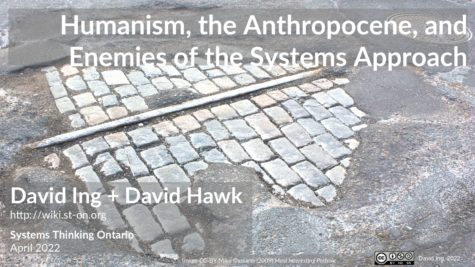Many who espouse systems thinking call themselves humanists, placing human beings and human social systems at the forefront of their efforts. In the early 21st century, the anthropocene was introduced as a new geological epoch, in recognition that the most significant impacts shaping the Earth’s atmosphere comes from human activity. Can human beings share our world more equitably with other living beings, or will our nature lead to a tragic outcomes of our own making?
For the April 2022 session of Systems Thinking Ontario, David Ing reviewed some prereadings for a shared foundational context. David L. Hawk was then invited to lead a discussion on the Systems Approach and its Enemies.
The conversation amongst participants was recorded, as an open discussion across a variety of perspectives.
This video available on Youtube has also been archived on the Internet Archive .
| Video | H.264 MP4 |
| April 11 (1h37m) |
[20220411_ST-ON HumanismAnthropoceneEnemiesSystemsApproach Ing_Hawk.m4v] (HDPlus 726kbps 627MB) [on the Internet Archive] |
Audio downloadable onto mobile devices was transcoded from the video into MP3.
| Audio | |
| April 11 (1h37m) |
[20220411_ST-ON HumanismAnthropoceneEnemiesSystemsApproach Ing_Hawk.mp3] (92.9MB) |
Social systems thinking is part of systems thinking. However, systems thinking could have a stronger appreciation of more than just human systems.
Here is the original Systems Thinking Ontario session description.
Humanism is “most generally, any philosophy concerned to emphasize human welfare and dignity, and either optimistic about the powers of human reason, or at least insistent that we have no alternative but to use it as best we can” (Oxford Dictionary of Philosophy).
The anthropocene “defines Earth’s most recent geologic time period (Anthropocene) as being human-influenced, or anthropogenic, based on overwhelming global evidence that atmospheric, geologic, hydrologic, biospheric and other earth system processes are now altered by humans” (Encyclopedia of Earth).
The systems approach “belongs to a whole class of approaches to managing and planning our human affairs with the intent that we as a living species conduct ourselves properly in this world”. (Churchman 1979, p. 8).
- It is designed to avoid the “environmental fallacy” of living and deciding outside of the systems approach, rather than being in the systems approach.
- Churchman specified four enemies of the systems approach:
- politics,
- morality,
- religion, and
- aesthetics.
- “What is common to all the enemies is that none of them accepts the reality of the ‘whole system’: we do not exist in such a system”.
- “To me these enemies provide a powerful way of learning about the systems approach, precisely because they enable the rational mind to step outside itself and to observe itself (from the vantage point of the enemies).” (Churchman 1979, p. 23).
In a chapter on “Humans Regulating Humans”, David Hawk writes:
- “For Jung, feeling and thinking are dominantly rational functions used for “ordering” and are the product of voluntary mental events. Intuition and sensing, on the other hand, are dominantly non-rational functions used for “perceiving” and are the products of involuntary human events initiated by the physical world. Rational functions are triggered by the human mind, while non-rational functions are triggered by the environment. Both aspects are important for regulation in complex environments. (Hawk 2019, p. 56)
Can we reconcile humanism, the anthropocene, and enemies of the systems approach?
Suggested pre-reading:
Gallopín, Gilberto. 2003. A Systems Approach to Sustainability and Sustainable Development. Economic Commission for Latin America and the Caribbean 64. United Nations Publications. https://repositorio.cepal.org/handle/11362/5759 .
Ehrenfeld, David W. 1981. The Arrogance of Humanism. Oxford University Press.
-
Excerpts are available at https://ingbrief.wordpress.com/2022/03/16/the-arrogance-of-humanism-1978-1981-david-w-ehrenfeld/ .
-
An interview is at: Ehrenfeld, David W., and John Livingstone. 1990. “The Age of Ecology, Part Two” Radio Broadcast. CBC Ideas. Canadian Broadcasting Corporation. https://www.davidcayley.com/podcasts/2016/6/4/age-of-ecology-part-two.
Heinberg, Richard. 2017. “Systemic Change Driven by Moral Awakening Is Our Only Hope.” EcoWatch (blog). August 14, 2017. https://www.ecowatch.com/climate-change-heinberg-2471869927.html.
-
A republication of that content under a different title, with many responses (worth reading!) is at Heinberg, Richard. 2017. “Why Climate Change Isn’t Our Biggest Environmental Problem, and Why Technology Won’t Save Us.” Post Carbon Institute (blog). August 17, 2017. https://www.postcarbon.org/why-climate-change-isnt-our-biggest-environmental-problem-and-why-technology-wont-save-us/.
Churchman, C. West. 1979. The Systems Approach and Its Enemies. New York: Basic Books.
-
Since softcopy versions of this book don’t seem to exist, there are excerpts available at https://coevolving.com/blogs/index.php/archive/the-systems-approach-and-its-enemies-c-west-churchman-1979/
Hawk, David L. 2019. Too Early, Too Late, Now What? AuthorHouse. https://www.authorhouse.com/en/bookstore/bookdetails/799308-too-early-too-late-now-what.
-
Softcopy is available for Amazon Kindle and on Kobo . The foreword is at https://davidhawk.com/2020/02/02/too-early-too-late-now-what/ .



